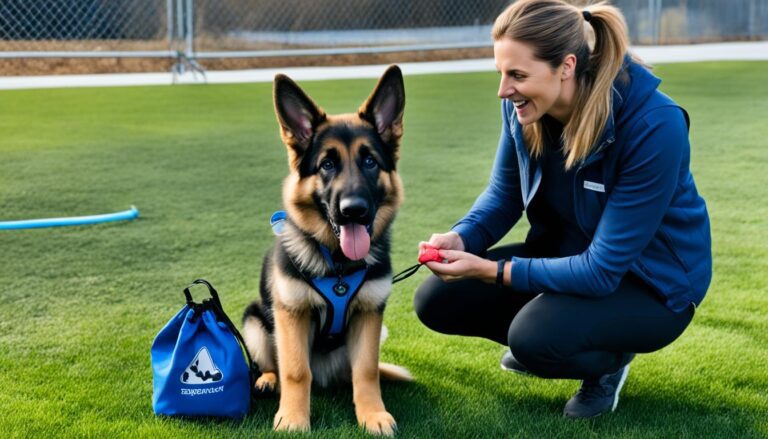Socialize Your Puppy to Curb Excess Barking
Did you know that 40% of puppies develop excessive barking behavior within the first six months of their lives? Excessive barking can be a challenging problem for dog owners, causing frustration and even strained relationships with neighbors. Fortunately, there is a proactive solution: socializing your puppy. By providing proper socialization and training, you can prevent excessive barking and set the foundation for a well-behaved and happy companion.
Key Takeaways:
- Socialization is key to preventing excessive barking in puppies.
- Understanding the reasons behind your puppy’s barking behavior is crucial for effective training.
- Consistency, positive reinforcement, and removing barking triggers are essential techniques to reduce excessive barking.
- Seek professional help if your puppy’s barking persists despite training efforts.
- Remember that every puppy is unique, so finding the right approach may require patience and experimentation.
Techniques to Reduce Excessive Barking in Puppies
When it comes to puppy training, reducing excessive barking is a common challenge that many owners face. Fortunately, there are several effective techniques that can help curb this behavior and create a well-behaved and quiet companion.
1. Consistency is Key
Consistency is crucial when training your puppy to reduce excessive barking. It’s important to set clear rules and expectations and ensure that everyone in your household follows them consistently. This will help your puppy understand what behaviors are acceptable and what are not.
2. Positive Reinforcement
Using positive reinforcement techniques can be highly effective in training your puppy to stop excessive barking. When your puppy behaves well and remains quiet, reward them with treats, praise, and affection. This will encourage them to repeat the desired behavior and reinforce their understanding of what is expected of them.
3. Socialization
Socializing your puppy with a wide variety of people, animals, and environments is crucial for their overall development and can help reduce excessive barking. Exposing your puppy to different situations and ensuring positive experiences will help them feel more comfortable and confident, reducing their need to bark out of fear or anxiety.
4. Obedience Training
Obedience training plays a vital role in teaching your puppy how to behave appropriately and can help address excessive barking. Enrolling your puppy in a reputable dog training class or working with a professional trainer can provide you with the necessary tools and guidance to effectively train your puppy to stop barking excessively.
5. Environmental Management
Managing the environment to remove triggers that may cause your puppy to bark excessively can be an effective technique. For example, if your puppy barks at passersby outside the window, consider closing the curtains or using window film to block their view. Finding alternative ways for your puppy to communicate their needs, such as teaching them to ring a bell to go outside, can also help redirect their barking behavior.
6. Patience and Persistence
Remember, training a puppy takes time, patience, and consistency. It is important to remain calm and avoid yelling or scolding your puppy, as this can create fear or anxiety and potentially exacerbate the barking behavior. With perseverance and a positive approach, you can successfully reduce excessive barking and cultivate a well-behaved and happy puppy.
| Technique | Description |
|---|---|
| Consistency | Set clear rules and expectations consistently |
| Positive Reinforcement | Reward desired behavior with treats and praise |
| Socialization | Expose your puppy to different people, animals, and environments |
| Obedience Training | Enroll your puppy in dog training classes or work with a professional trainer |
| Environmental Management | Remove triggers that may cause excessive barking |
| Patience and Persistence | Training takes time and consistency |
Understanding and Training Puppy Barking Behavior
Puppy barking is a natural behavior that serves several purposes, including play, greeting, and defense. To effectively train your puppy and curb excessive barking, it’s crucial to understand the reasons behind their vocalizations.
Consistency is key in puppy training. Establishing clear rules and responses will help your puppy understand what is expected of them. Address any physical or psychological issues that may be causing excessive barking, as these can contribute to the behavior.
Positive reinforcement techniques are highly effective in training puppies to reduce barking. Rewarding desired behaviors with treats, praise, or playtime can encourage your puppy to adopt alternative ways of communication. It’s important to avoid comforting a barking puppy, as this can reinforce the behavior.
Patience and consistency are essential throughout the training process. Every puppy is unique, so what works for one may not work for another. If your puppy’s barking persists despite your efforts, seeking professional assistance or exploring different anti-bark techniques can provide further guidance.
FAQ
How can I socialize my puppy to prevent excessive barking?
Socializing your puppy is key in preventing excessive barking. Introduce your puppy to a variety of people, animals, and environments in a positive and controlled manner. This can help them learn to feel comfortable and confident in different situations, reducing the likelihood of barking out of fear or anxiety.
What should I do if my puppy barks excessively?
If your puppy is barking excessively, it’s important to first identify the underlying cause. Is your puppy bored, anxious, or seeking attention? Once you understand the reason for the barking, you can address it accordingly. Providing mental and physical stimulation, setting consistent boundaries, and rewarding quiet behavior can help reduce excessive barking.
Can dog training classes help reduce my puppy’s barking?
Yes, enrolling your puppy in dog training classes can be beneficial in reducing excessive barking. These classes provide structured training sessions and teach both you and your puppy how to communicate effectively. With the guidance of a professional trainer, you can learn techniques and commands that discourage barking and promote positive behavior.
Is it effective to use treats for positive reinforcement in puppy training?
Yes, using treats as positive reinforcement can be an effective method in puppy training, including reducing excessive barking. When your puppy behaves as desired and refrains from barking, reward them with a treat and verbal praise. This helps reinforce the idea that being calm and quiet is rewarded, encouraging them to continue exhibiting that behavior.
How long does it take to see results in reducing puppy barking?
The time it takes to see results in reducing puppy barking can vary depending on the individual puppy and the consistency of training. It’s important to be patient and consistent in your efforts. Some puppies may show improvement in a matter of weeks, while others may take several months to fully develop good behavior and reduce barking.
What if my puppy’s barking persists despite my training efforts?
If your puppy’s barking persists despite your training efforts, it may be helpful to seek professional assistance from a qualified dog trainer or behaviorist. They can evaluate your puppy’s behavior, identify any underlying issues, and provide personalized guidance and training techniques to address the excessive barking.
How can I prevent my puppy from barking at specific triggers?
To prevent your puppy from barking at specific triggers, you can try various techniques. For example, if your puppy barks at passersby outside, closing curtains or using window coverings can help block their view and reduce the stimulation. You can also teach your puppy an alternative behavior, such as jingling a bell to indicate they need to go outside rather than barking.







